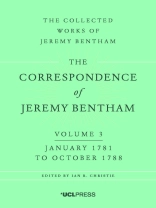The first five volumes of the Correspondence of Jeremy Bentham contain over 1, 300 letters written both to and from Bentham over a 50-year period, beginning in 1752 (aged three) with his earliest surviving letter to his grandmother, and ending in 1797 with correspondence concerning his attempts to set up a national scheme for the provision of poor relief. Against the background of the debates on the American Revolution of 1776 and the French Revolution of 1789, to which he made significant contributions, Bentham worked first on producing a complete penal code, which involved him in detailed explorations of fundamental legal ideas, and then on his panopticon prison scheme. Despite developing a host of original and ground-breaking ideas, contained in a mass of manuscripts, he published little during these years, and remained, at the close of this period, a relatively obscure individual. Nevertheless, these volumes reveal how the foundations were laid for the remarkable rise of Benthamite utilitarianism in the early nineteenth century.
The letters in this volume document Bentham’s meeting and friendship with the Earl of Shelburne (later the Marquis of Lansdowne), which opened a whole new set of opportunities for him, as well as his extraordinary journey, by way of the Mediterranean, to visit his brother Samuel in Russia.
Praise for the Correspondence of Jeremy Bentham, volumes 1-5
‘These volumes provide significant additions to our understanding of Bentham’s work in the first half of his life up to 1797. The insights they offer into Bentham’s activities, ideas and method cast light on his philosophical and political positions in a seminal period in British and European history.’ British Journal for the History of Philosophy
Tabella dei contenuti
List of Letters in Volume 3
Introduction to Volume 3
1. The Letters xxi
2. Outline of Bentham’s life, January 1781 to October 1788
A List of Missing Letters xxxiv Key to Symbols and Abbreviations
THE CORRESPONDENCE January 1781–October 1788
Index
Circa l’autore
Ian R. Christie (1919–98), historian, was educated at Magdalen College, Oxford, before being appointed successively as Assistant Lecturer 1948–51, Lecturer 1951–60, Reader 1960–6, Professor 1966–79, and finally Astor Professor of British History 1979–84, in the Department of History, University College London (UCL).












